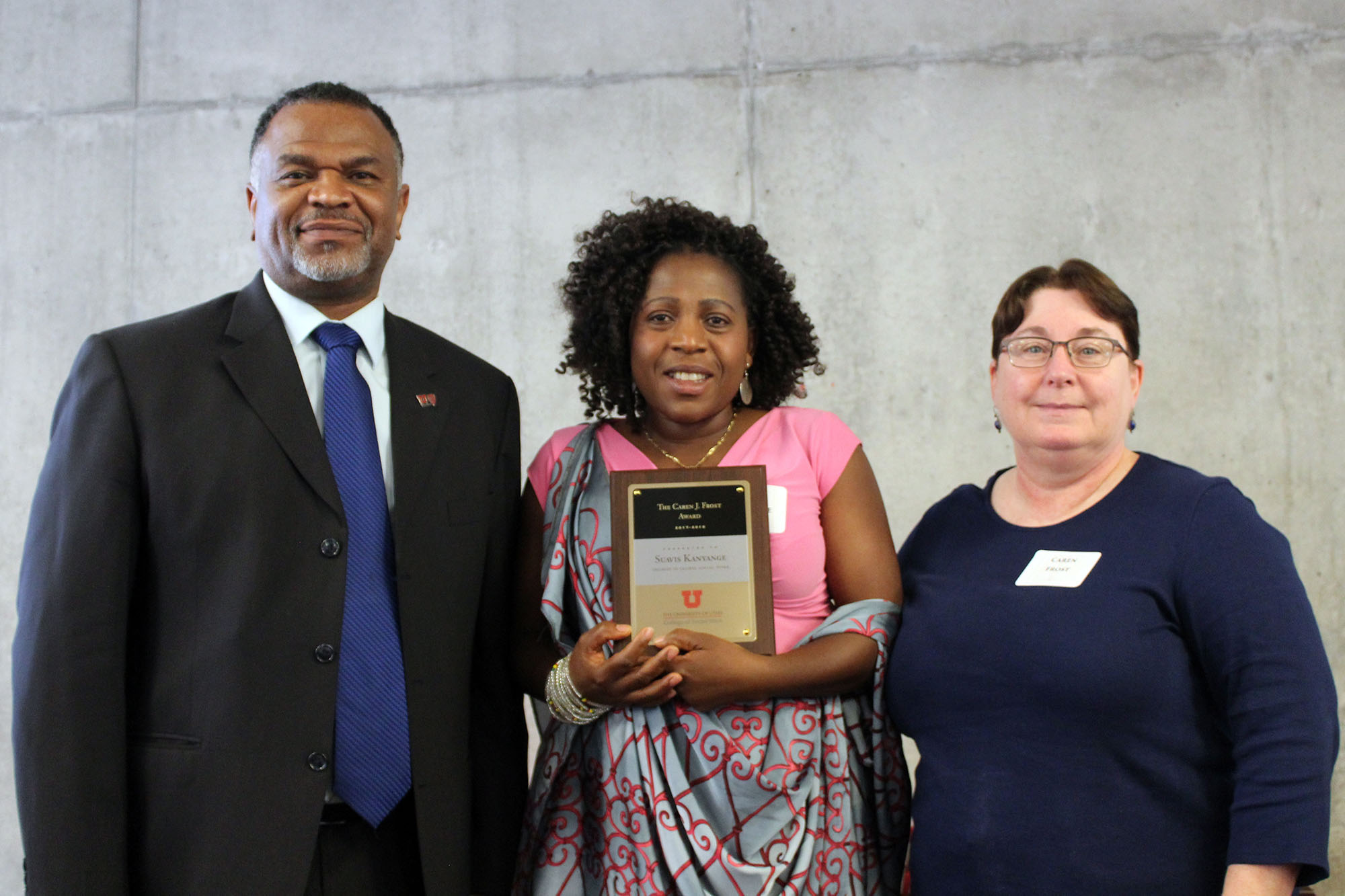Suavis Kanyange is Everywhere … and Invites You to Join Her
By Stephanie Dawson Pack, MEd, PR/Marketing Assistant
 “Oh my gosh, I love every single thing.”
“Oh my gosh, I love every single thing.”
I did a mental double take when Suavis Kanyange, case manager at the University of Utah Hospital Outpatient Treatment Center, gave me that answer. I had asked, “What do you love most about the work you do?” expecting an answer that was specific and concrete about her job. Maybe, “I love working with patients to connect them with the resources to meet their precise needs,” or “I love being able to apply knowledge I gained in the classroom in real world settings.” Ms. Kanyange does love those things, and mentioned them specifically when she went on to further explain her answer; and it’s clear talking to her that she’s not exaggerating when she says she loves everything about her job.
Through every step of Ms. Kanyange’s journey—from refugee community member, to case manager with the state, to her current position—learning more has been one of her foremost goals. When she went through the Case Management Certificate Program in the U’s College of Social Work, her primary motivation was not about what it would do for her, but what it would do for her clients. “I thought, ‘How can I be more useful for people?’ It’s not just about knowing the resources; it’s also about knowing the policies in place so you know what’s allowed and what isn’t.”
Being better able to support others was also a big motivation in her decision to earn an MSW. Having a refugee background herself, she wanted to do more to support her community. “There is a difference when you do therapy in the language a client speaks versus when you have an interpreter in between,” she said.
To illustrate this, Ms. Kanyange explained that in her native tongue, Kirundi, a native language of Burundi, the word “depression” doesn’t exist. There is literally no corollary. The closest word is a term meaning “crazy person,” because when you’re depressed, you’re not functioning like other people. “But you are not crazy because you are depressed,” she said. Ms. Kanyange explained that a provider from a different culture might not know to offer this assurance. Even if they do, there are still various barriers that come with interpretation. With the tight-knit nature of the refugee community, interpreters for certain languages may be part of the patient’s community. This can lead to the patient withholding how they really feel in fear of being marginalized or outed in their community. For Ms. Kanyange, this nuance of language and understanding of culture are vital to providing good care. “When you speak a person’s own language, you do more to support them.”
Her dedication to her community is present in other ways as well. “My education and the experiences I have at my job aren’t just for this office only—they help my entire community,” she said, as she widely gestured at the cubicle walls visible on Zoom.
“I am everywhere,” she said in reference to her job at the hospital. But nearly every day, Ms. Kanyange is also actively engaged in helping others with refugee backgrounds—sometimes it’s a call from a neighbor who needs help reading a letter. Sometimes it’s passing a message from a local school to a parent, or leading a session where community members can ask questions they haven’t been able to find answers to. “Even if I’m not paid for it, I want to keep the train moving,” she said. “I can’t let my community members suffer when it would be easy for me to help them. I am always part of my community.”
And she wants others to actively engage with her community as well …. At the end of every interview, it’s standard practice for me to ask the question: “What didn’t I ask you that I should have?” Ms. Kanyange’s response surprised me again: “You should have asked me ‘Suavis, what can I do to help people who are challenged? I am a white person, I am privileged, I am from the U.S. What can I do to advocate for and help refugees?’” Her answer is grounded in both her lived experience and her social work education, rooted in openness and lack of judgement. “Be open,” she said. “Ask questions. Tell me the things that I don’t know about living here that you do.”
Had I asked the question, she would have told me to put myself in someone else’s shoes. “Imagine being a refugee child,” she prompted. “They are put straight into the classroom with other kids their age. Sitting there for six hours and not understanding anything. They don’t understand the language; most of them haven’t been in schools before. It’s adding trauma to other trauma.” She continued, “Consider, what you can do to help those kids. What ways can social workers lead and influence policies to change the way we do things?” To Ms. Kanyange, this advocacy, combined with understanding, is what’s at the heart of being good social workers and good people. “Advocate for people who are challenged. Meet people where they are.”
